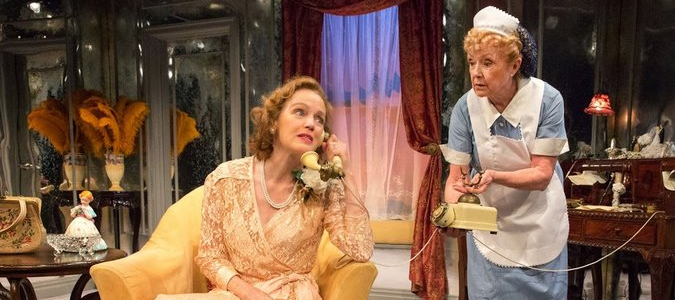

The Fatal Weakness
Opening Night: September 15, 2014
Closing: October 26, 2014
Theater: Mint Theatre
The Fatal Weakness, George Kelly’s last produced play, is a smart comedy about romance, marriage and commitment. After 28 years of marriage, Ollie Espenshade is still an incurable romantic (her fatal weakness). Perhaps discovering that her husband is a lying cheat will cure her?
BUY TICKETSREAD THE REVIEWS:
September 15, 2014
The Mint Theater Company has gained a stellar reputation for researching, finding, and presenting plays that greatly entertained audiences back in the day but now are shrouded in obscurity – that is, until the Mint gets to them. Heading in to see the company’s current production, George Kelly’s The Fatal Weakness (1946), I commented to a colleague that it’s remarkable how often the plays thus excavated and mounted prove to be wonderfully stage worthy in our own time, considering that they’re superficially so “dated” in terms of milieu, language, character types, and so on. A stellar example: John Van Druten’s London Wall, such a triumph for the Mint last season that it was chosen as one of several recent Off-Broadway productions to be telecast by WNET-13 as part of its new “Theater Close-Up” Series. (London Wall is set to air on Thursday, October 2 at 9pm, with a repeat telecast on Sunday the 5th at 10:30. Be sure to watch it or DVR it or whatever.) Still, it only stands to reason that some of the plays revived by the company turn out to be less good than others. In reviewing the Mint’s 2013 production of Kelly’s Philip Goes Forth, I commented that the play reminded me of some of the rarely revived early operas of Giuseppe Verdi in that it contains a large amount of uninspired writing occasionally sparked by some truly creative passages that make us understand why Kelly was an audience favorite for many years.
READ THE REVIEWSeptember 16, 2014
Taking in a performance of George Kelly’s new comedy was a frequent occurrence for theatregoers during the 1920s and 30s, but his 10 Broadway plays (including the Pulitzer-winner, Craig’s Wife) and one musical revue have pretty much faded from the modern repertory Last year the Mint Theater Company, specialists in revisiting the works of once-popular playwrights, mounted his delightful 1931 excursion into bohemian Greenwich Village, Philip Goes Forth. They follow up now with Kelly’s swan song, his 1946 drawing room comedy/drama of infidelity, The Fatal Weakness. That title flaw is the hopeless romanticism of Mrs. Ollie Espenshade (graceful and thoughtful Kristin Griffith), a woman of comfortable means who loves crashing wedding ceremonies for fun, but who is blissfully unaware that her husband (gruffly masculine Cliff Bemis) has fallen out of love and intends to divorce her and remarry.
READ THE REVIEWSeptember 15, 2014
George Kelly was a playwright of some renown in the early part of the last century. Over the course of 1920s and ’30s, he had nine plays on Broadway, most notably The Show Off and his 1925 Pulitzer Prize winner, Craig’s Wife. Kelly’s status gradually diminished over the years; by this point in time, he’s faded so far into obscurity that his name isn’t even recognizable. Off-Broadway’s Mint Theater, a company dedicated to the preservation of rarely seen plays, has taken it upon itself to bring Kelly back into the spotlight. After a 2013 revival of his play Philip Goes Forth, they’re returning to his canon with a production of his 1947 Broadway swan song, The Fatal Weakness, which hasn’t seen a major New York production since the 1970s. The title refers to the incurable romanticism within Mrs. Ollie Espenshade (Kristin Griffith), a society woman whose idea of a delightful afternoon is to attend a stranger’s wedding. But Ollie has seemed to miss that her husband of a great many years, Mr. Paul Espenshade (Cliff Bemis), has not only fallen out of love with her, but is planning to marry someone else. This she learns from three people: her gossipy best friend Mabel (Cynthia Darlow), her son-in-law Vernon (Sean Patrick Hopkins) and, eventually, her daughter Penny (Victoria Mack).
READ THE REVIEWSeptember 15, 2014
The two couples in The Fatal Weakness wrestle with infidelity and other troubles, but they’re completely nonchalant about it. At least, they seem that way. Maybe they just knew how to act like adults back in 1946. That was the year the play opened on Broadway, the last hurrah for author George Kelly (who happened to be the uncle of actress/princess Grace). His satirical comedies were quite popular in the 1920s and ’30s, but his star had faded by the mid-’40s, and the show didn’t do all that well. It’s not clear what attracted the Mint company and director Jesse Marchese to this particular drawing-room dramedy. It’s well-crafted, but the most interesting thing about it is its startling lack of sentimentality.
READ THE REVIEWSeptember 16, 2014
Sometimes a play is more interesting in the future than in its own time. The Fatal Weakness, a domestic comedy with a drama at its core, was apparently unloved in its day; its 1946 Broadway premiere ran for only 119 performances despite having Ina Claire, a prominent stage actress, in the lead role. But here in 2014, the Mint Theater Company is making this George Kelly work an amusing, affecting reminder that the institution of marriage has been under siege for much longer than we tend to think. Kristin Griffith channels Katharine Hepburn as she brings to life the skittish central character, Ollie Espenshade. Ollie is a bundle of upper-middle-class nerves in a daffy opening scene in which she and a confidante, Mabel (Cynthia Darlow), review the evidence that Ollie’s affable husband, Paul (Cliff Bemis), might be having an affair. Today Ollie would fit into any reality TV show with “Housewives” in the title. The couple’s daughter, Penny (Victoria Mack), might be the creator of another breed of reality show, the kind that exploits alternate forms of courtship (Naked Dating) and couplehood (Sister Wives). With marital issues of her own, Penny spouts unorthodox theories on love, marriage and child-rearing that remind us the questioning of male-female dynamics did not begin in our time or even with Gloria Steinem.
READ THE REVIEW






















